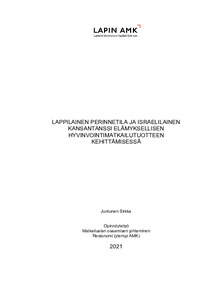Lappilainen perinnetila ja israelilainen kansantanssi elämyksellisen hyvinvointimatkailutuotteen kehittämisessä
Juntunen, Sirkka (2021)
Juntunen, Sirkka
2021
All rights reserved. This publication is copyrighted. You may download, display and print it for Your own personal use. Commercial use is prohibited.
Julkaisun pysyvä osoite on
https://urn.fi/URN:NBN:fi:amk-2021120724027
https://urn.fi/URN:NBN:fi:amk-2021120724027
Tiivistelmä
Työn tarkoituksena oli kehittää uusi hyvinvointimatkailun tuote toimeksi antavalle yritykselle WellnesSHHille kohteena Suomen Lähetysseuran omistama perinnetila Kangaslampi Ranualla. Tietoperusta teemoitettiin hyvinvointimatkailun määritelmällä sekä sen elämyksellisyydellä, eri tanssimuotojen vaikutuksilla, asiakaslähtöisellä muotoiluajattelulla sekä yhteiskehittämiseen liittyvillä toimintatavoilla.
Tutkimus oli laadullinen, johon menetelmänä käytettiin palvelumuotoilua. Aineisto kerättiin havainnoinnilla, ryhmähaastattelulla ja aivoriihellä. Prosessissa toteutettiin tuotteen testauksessa pilotointi, johon sisältyi havainnointi ja ryhmähaastattelu. Se toteutettiin Kangaslammella.
Tuloksiksi muotoutui neljä erilaista asiakasprofiilia. Varsinaiseksi tämän tutkimuksen tuotokseksi loin tutkimustulosten pohjalta mallin elämyksellisyyden muodostumisesta hyvinvointimatkailutuotteessa. Malliin sopivimmaksi valitsin koronapandemian takia työstään kuormittuneen perheenisän profiilin. Tutkimustulokset ovat luotettavia, mutta osin vajaita. Jatkotutkimukselle löytyi useita näkökulmia toimeksi antavan yrityksen palvelujen kehittämiseksi. Lisäksi ne antavat suuntaa myös laajemmin Suomessa kulttuuri- ja hyvinvointialojen toimijoille. Purpose of the thesis was to develope a new memorable wellbeing tourism
product for the company WellnesSHH. The product would be implemented at a Lappish Heritage Farm Kangaslampi in Ranua. Kangaslampi Heritage Farm is owned by Felm, the agency of the Evangelical Lutheran Church of Finland. In the theory part the concepts wellbeing tourism and how to experience it, effects of different dance forms, customer oriented design thinking and co-creation were defined.
The research was qualitative and service design was used as a method to carry it out. Material was collected by observing, focus group and brainstorming. A pilot test, including Israeli Folk Dance, was made to test the product during the developing process at Kangaslampi Heritage Farm.
As results of the thesis four different customer profiles are created. In them all, a motive to start a wellbeing travel is to promote one’s inner health, in some memorable way. The final result of the research is a model, how experience is formed in a wellbeing tourism product. The most compatible profile is to this model is a hardworking, stressful family father due to Covid-19 pandemic. Results of the thesis are valid but to some extend limited. Further research can be carried out to develope WellnesSHH wellbeing services. The results also give direction to other wellbeing based parties in broader sense, in cultural and health care branches in Finland.
Tutkimus oli laadullinen, johon menetelmänä käytettiin palvelumuotoilua. Aineisto kerättiin havainnoinnilla, ryhmähaastattelulla ja aivoriihellä. Prosessissa toteutettiin tuotteen testauksessa pilotointi, johon sisältyi havainnointi ja ryhmähaastattelu. Se toteutettiin Kangaslammella.
Tuloksiksi muotoutui neljä erilaista asiakasprofiilia. Varsinaiseksi tämän tutkimuksen tuotokseksi loin tutkimustulosten pohjalta mallin elämyksellisyyden muodostumisesta hyvinvointimatkailutuotteessa. Malliin sopivimmaksi valitsin koronapandemian takia työstään kuormittuneen perheenisän profiilin. Tutkimustulokset ovat luotettavia, mutta osin vajaita. Jatkotutkimukselle löytyi useita näkökulmia toimeksi antavan yrityksen palvelujen kehittämiseksi. Lisäksi ne antavat suuntaa myös laajemmin Suomessa kulttuuri- ja hyvinvointialojen toimijoille.
product for the company WellnesSHH. The product would be implemented at a Lappish Heritage Farm Kangaslampi in Ranua. Kangaslampi Heritage Farm is owned by Felm, the agency of the Evangelical Lutheran Church of Finland. In the theory part the concepts wellbeing tourism and how to experience it, effects of different dance forms, customer oriented design thinking and co-creation were defined.
The research was qualitative and service design was used as a method to carry it out. Material was collected by observing, focus group and brainstorming. A pilot test, including Israeli Folk Dance, was made to test the product during the developing process at Kangaslampi Heritage Farm.
As results of the thesis four different customer profiles are created. In them all, a motive to start a wellbeing travel is to promote one’s inner health, in some memorable way. The final result of the research is a model, how experience is formed in a wellbeing tourism product. The most compatible profile is to this model is a hardworking, stressful family father due to Covid-19 pandemic. Results of the thesis are valid but to some extend limited. Further research can be carried out to develope WellnesSHH wellbeing services. The results also give direction to other wellbeing based parties in broader sense, in cultural and health care branches in Finland.
